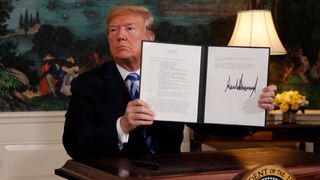Iran will face the "strongest sanctions in history" if it doesn't change course, US Secretary of State Mike Pompeo has warned.
Following US President Donald Trump's withdrawal from the 2015 Iran nuclear deal, Tehran has now been issued with a list of 12 demands by Washington.
In his first major policy speech since taking on the role of America's top diplomat last month, Mr Pompeo detailed the requirements Iran must abide by in a new agreement.
This would replace the Joint Comprehensive Plan of Action (JCPOA), signed under Barack Obama but branded the "worst deal ever" by Mr Trump even before he took office.
The US will "apply unprecedented financial pressure" to force Iran into new negotiations, Mr Pompeo said on Monday.
"These will end up being the strongest sanctions in history by the time we are complete," he declared, also issuing a promise that the US will ensure "Iran has no possible path to a nuclear weapon, ever".
The JCPOA curtailed Iran's nuclear programme in exchange for sanctions relief. Mr Trump's decision to withdraw from the deal earned a rebuke from the UK, Germany and France, who have vowed to continue to abide by the agreement.
Mr Pompeo acknowledged "that is their decision to make", but added: "They know where we stand."
Imploring Iran to "choose a different path", Mr Pompeo said America would be "fully prepared to respond" if the country resumed its nuclear programme.
He said: "Our demands on Iran are not unreasonable: give up your programme.
"Should they choose to go back, should they begin to enrich, we are fully prepared to respond to that as well.
"I hope they will make a different decision, choose a different path," he added.
Mr Pompeo's 12-strong list of demands for Iran include Tehran ceasing the enrichment of uranium, which is allowed within strict limits by the JCPOA.
Iran must also allow "unqualified access to all sites throughout the country" and declare all previous efforts to build a nuclear weapon.
In addition, Tehran should end support for Houthi rebels in Yemen, "withdraw all forces" from Syria, cut ties with Hezbollah and stop threatening Israel, Mr Pompeo added.
US citizens missing in Iran or being held on "spurious charges" must also be released, the US secretary of state said.
Mr Pompeo said: "This list may seem long to some, but it is simply a reflection of the massive scope of Iranian malign behaviour.
"America did not create this need for changed behaviour. Iran did."
 2:42
2:42However, in return, Mr Pompeo offered Iran a series of concessions from Washington if it makes "major changes".
This would include the lifting of all sanctions, the restoration of full diplomatic and commercial ties and support for the modernisation of Iran's economy.
The US secretary of state said: "It is America's hope that our labours toward peace and security will bear fruit for the long-suffering people of Iran."
But EU foreign policy chief Federica Mogherini said there was "no alternative" to the Iran deal.
She said: "Secretary Pompeo's speech has not demonstrated how walking away from the JCPOA has made or will make the region safer from the threat of nuclear proliferation or how it puts us in a better position to influence Iran's conduct in areas outside the scope of JCPOA."
Speaking shortly before Mr Pompeo's speech, Foreign Secretary Boris Johnson described Mr Trump's apparent wish for a "new jumbo Iran treaty" as "very, very difficult" to broker.
He said: "I don't see that being very easy to achieve, in anything like a reasonable timetable.
"The advantage of the JCPOA was that it had a very clear objective.
More from Iran
"It protected the world from an Iranian nuclear bomb, and in return it gave the Iranians some recognisable economic benefits. That was at the core of it.
"The Americans have walked away from that."
[contf] [contfnew] 
Sky News
[contfnewc] [contfnewc]





